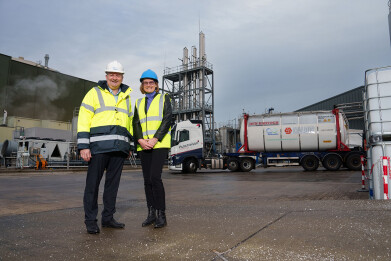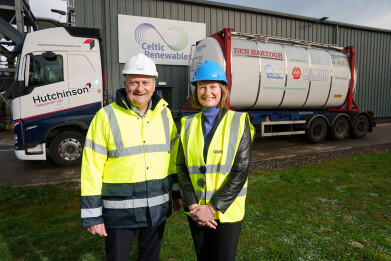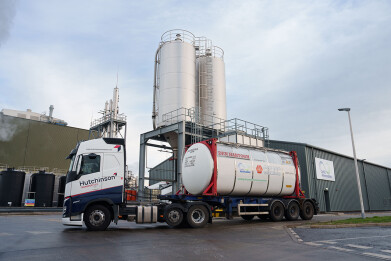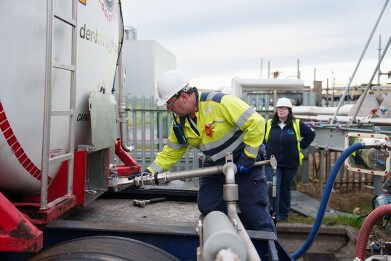-
 Mark Simmers, CEO of Celtic Renewables and Bettina Brierley, Product Group Leader Caldic UK. (photo ©Ashley Coombes)
Mark Simmers, CEO of Celtic Renewables and Bettina Brierley, Product Group Leader Caldic UK. (photo ©Ashley Coombes) -
 Mark Simmers, CEO of Celtic Renewables and Bettina Brierley, Product Group Leader Caldic UK. (photo ©Ashley Coombes)
Mark Simmers, CEO of Celtic Renewables and Bettina Brierley, Product Group Leader Caldic UK. (photo ©Ashley Coombes)
Waste management
Scottish biorefinery ships world’s first tanker of green chemicals
Nov 26 2024
Celtic Renewables has sent its first tanker of sustainably produced bioacetone and biobutanol from its biorefinery in Grangemouth, Scotland, marking a significant milestone in the global shift towards green chemicals. This achievement follows an investment of over £60 million that enabled the construction of Scotland’s first biorefinery and its commercial-scale operations.
The bioacetone and biobutanol cargo is headed to a processing plant in Chesterfield, as part of a long-term distribution agreement with Caldic, an internationally recognised chemical distributor. Caldic will supply these green chemicals to manufacturers in diverse industries, including pharmaceuticals, personal care, homecare products, and more—ranging from screen wash and paints to shampoos, soaps, and perfumes.
Celtic Renewables’ innovative low-carbon technology transforms by-products and waste from industries such as food, drink, and agriculture—like whisky residues—into valuable green chemicals used in everyday products. This process results in up to 65% lower carbon emissions compared to traditional petrochemical production. For every tonne of bioacetone or biobutanol produced, nearly 3 tonnes of carbon are saved.
As demand for sustainable chemicals grows, Celtic Renewables is tapping into the $2 billion global market for green chemicals. With climate change mitigation increasingly prioritised, many major corporations with ties to the chemical industry are setting ambitious net-zero targets, making the need for green chemicals more urgent.
This shipment marks the first of many regular deliveries under Celtic Renewables' distribution agreement with Caldic.
Mark Simmers, CEO of Celtic Renewables, expressed pride in the achievement: “Our biorefinery is the first of its kind to produce green chemicals at this scale. From a lab-based idea, we’ve now scaled up fermentation to produce 100,000 litres per batch. This process, developed and proven in Scotland, positions us at the forefront of the green chemical revolution.”
Looking ahead, Simmers outlined plans for the next phase of expansion: “We are exploring the development of three to four larger scale biorefineries within the next 4 to 5 years, aiming for a combined output of 32,000 tonnes per year. We also plan to expand our technology globally through licensing and partnerships.”
The chemical industry is heavily reliant on fossil fuels, but with growing demand for sustainable alternatives, Celtic Renewables’ bioacetone and biobutanol offer a promising solution to reduce carbon emissions in the sector.
Bettina Brierley, Product Group Leader at Caldic UK, commented on the significance of the partnership: “These green chemicals directly improve our customers' ESG ratings. They are a true example of circularity and will help our customers meet their net-zero goals by 2050. Demand for bioacetone and biobutanol is strong, and manufacturers are eager to transition away from fossil fuels. Celtic Renewables has developed a high-quality solution that can replace traditional petrochemical products and significantly reduce carbon footprints.”
Beyond reducing carbon emissions, Celtic Renewables’ process also provides a sustainable disposal solution for industries like food, drink, and agriculture. The technology produces secondary by-products like biogas and recycled water, which can be reintegrated into the process or sold back to suppliers, further promoting a circular economy.
The chemical sector is responsible for consuming 10% of all fossil fuels, and Celtic Renewables’ Grangemouth plant is a key step towards the UK’s goal of achieving net-zero emissions—a central topic at COP29. Simmers noted the significance of the timing: “Today’s milestone aligns perfectly with COP29, where discussions are focused on accelerating the phase-out of fossil fuels. At COP26, our biorefinery was still under construction. Now, at COP29, we’re shipping green chemicals around the world.”
Celtic Renewables has been operational since 2023, with its biorefinery completed in late 2022. Simmers concluded, “This is just the beginning. We’re excited to scale up our operations, attract investment, and develop future plants, helping to accelerate the global transition to green chemicals.”
Events
Aug 24 2025 Stockholm, Sweden and online
Aug 27 2025 Busan, South Korea
Sep 02 2025 Mexico City, Mexico
Sep 02 2025 Mexico City, Mexico
Sep 09 2025 Moscow, Russia







.jpg)






.jpg)




